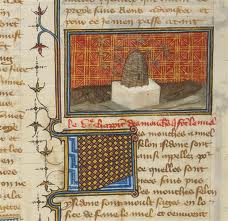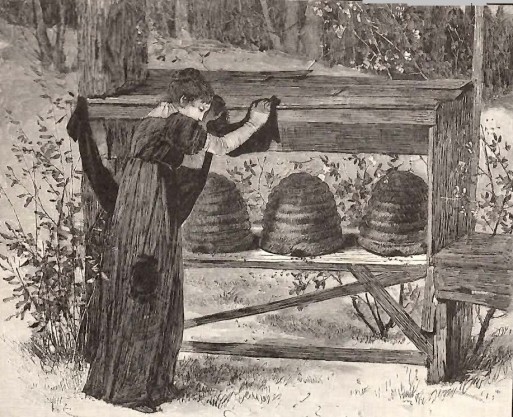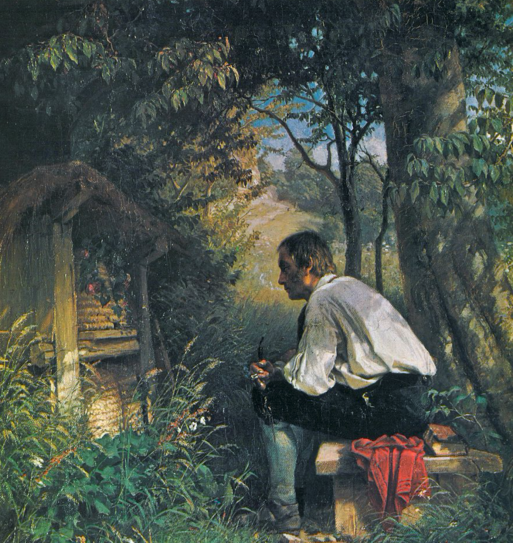Bees were highly prized in Medieval Europe for their honey and wax. The honey was used as a sweetener and medicine, as well as the key ingredient in mead — a mildly alcoholic drink that was consumed for its nutritive and restorative properties. Beeswax provided the cleanest-burning source of light at the time, which was necessary for illuminating dark, enclosed spaces. It was the norm to find bees kept at monasteries and manor houses, where they were tended with the greatest respect and considered part of the family or community.
Bees were considered to have a special intelligence regarding the mysterious unfolding of the universe.

A medieval English chronicle reads: “Honey is our chief sweetness, favourite salve and indispensable medicine.”
(Credit: carlenefederer.blogspot.ca)
Bees were considered to have a special intelligence regarding the mysterious unfolding of the universe. For this reason, their behavior was closely observed. Swarming bees were a cause for attentiveness: If they clustered around a dead branch, a human death was imminent. If they flew into a house, a stranger would soon call. If they rested on a roof, good luck was on its way. The reciprocal relationship between humans and bees was so important that the activities of bees were taken very seriously. In turn, it was observed that if there was discord within the resident human community, the bees would stop producing honey, die, or fly away.
For this reason, the “telling of the bees” was a closely observed tradition. Bees were informed of important activities in their keepers’ lives, such as long journeys, births, marriages and deaths. If the bees were not “put into mourning” after being informed of a death, it was believed they might fail to thrive or leave their hives.
Properly putting bees into mourning often involved draping the hives with black crepe fabric and leaving a piece of the funeral bread nearby, while gently singing to the bees to tell them what had happened.
Properly putting bees into mourning often involved draping the hives with black crepe fabric and leaving a piece of the funeral bread nearby, while gently singing to the bees to tell them what had happened. These doleful little rhymes were recorded from England to Germany, and eventually made their way to North America with the settling of the United States.

Putting bees into mourning
(Credit: beeclass.com)
Because of this intimate and sacred relationship between bees and their keepers, it was considered bad luck for money to exchange hands when procuring a hive. Instead, bees were bartered for or given as gifts. This view has carried over into modern-day concerns regarding the need to harvest from bees sustainably, according to supply rather than demand. As the world’s consumption of honey continues to increase, the need to sustain bee populations has become increasingly more important to the health of our ecosystems and humanity’s ability to thrive.
Look to John Greenleaf Whittier’s poem “Telling the Bees” for an eloquent description of this practice.

 Telling the Bees: A Medieval Funeral Tradition
Telling the Bees: A Medieval Funeral Tradition



 Our Annual Seven Holiday Gifts for Someone Who Is Grieving, 2024 Edition
Our Annual Seven Holiday Gifts for Someone Who Is Grieving, 2024 Edition
 “Making Mobiles” by Karolina Merska
“Making Mobiles” by Karolina Merska
 “Hands Up to the Sky” by Michael Franti & Spearhead
“Hands Up to the Sky” by Michael Franti & Spearhead














